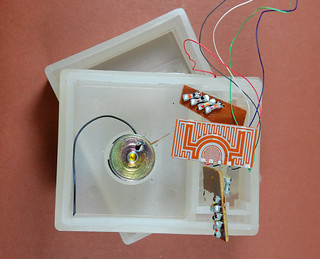Difference between revisions of "CdS"
(created page stub) |
m (Silicon cell page created to eliminate Red) |
||
| (11 intermediate revisions by 6 users not shown) | |||
| Line 1: | Line 1: | ||
| − | + | {{glossary}} | |
| − | {{ | + | '''CdS''' — Cadmium sulfide or selenide (CdS) is a photoconductive material commonly used in photoresistors<ref>[https://www.sciencedirect.com/topics/engineering/photoresistors Photoresistors] From: Design, Analysis, and Applications of Renewable Energy Systems, 2021 at ScienceDirect</ref>. |
| − | [[Category: | + | |
| + | {{Flickr_image | ||
| + | |image_source= http://www.flickr.com/photos/29504544@N08/5418587956/in/pool-camerawiki/ | ||
| + | |image= http://farm6.staticflickr.com/5136/5418587956_1d13660247_n.jpg | ||
| + | |image_align= left | ||
| + | |image_text= Cosina CdS Light meter | ||
| + | |image_by= Hans Kerensky | ||
| + | |image_rights= with permission | ||
| + | }} | ||
| + | In a photographic context, this refers to a type of electronic [[light meter]] using a photoresistor made of Cadmium Sulfide (CdS), selenide (CdSe) or a combinations of both (CdSSe) <ref>[https://www.jollinger.com/photo/meters/other/beginners_guide.html Ollinger's lightmeter guide]</ref>. Photoresistors change electrical resistance in response to the brightness of the scene. CdS meters became common in the 1960s, largely replacing [[Selenium]] cells, which were less sensitive and required a much larger light-collecting area. The smaller size of the CdS sensors allowed for miniaturization of lightmeters and practical TTL exposure. However, they might be slow to change from bright to low light conditions. By the end of the 1980s [[Silicon]] cells began replacing CdS. | ||
| + | |||
| + | While Selenium cells which generate their own electricity, CdS meters require a battery. CdS meters are sufficiently power-hungry that with most designs some form of switch is provided to turn off the meter circuit, to conserve battery life. (In a few cases, the photographer is simply expected to cap the lens; in darkness the current flow drops to a minimum.) | ||
| + | {{br}} | ||
| + | ==References== | ||
| + | <references/> | ||
| + | |||
| + | [[Category:Abbreviations]] | ||
| + | [[Category: meters]] | ||
Latest revision as of 13:38, 12 April 2024
CdS — Cadmium sulfide or selenide (CdS) is a photoconductive material commonly used in photoresistors[1].

|
| Cosina CdS Light meter image by Hans Kerensky (Image rights) |
In a photographic context, this refers to a type of electronic light meter using a photoresistor made of Cadmium Sulfide (CdS), selenide (CdSe) or a combinations of both (CdSSe) [2]. Photoresistors change electrical resistance in response to the brightness of the scene. CdS meters became common in the 1960s, largely replacing Selenium cells, which were less sensitive and required a much larger light-collecting area. The smaller size of the CdS sensors allowed for miniaturization of lightmeters and practical TTL exposure. However, they might be slow to change from bright to low light conditions. By the end of the 1980s Silicon cells began replacing CdS.
While Selenium cells which generate their own electricity, CdS meters require a battery. CdS meters are sufficiently power-hungry that with most designs some form of switch is provided to turn off the meter circuit, to conserve battery life. (In a few cases, the photographer is simply expected to cap the lens; in darkness the current flow drops to a minimum.)
References
- ↑ Photoresistors From: Design, Analysis, and Applications of Renewable Energy Systems, 2021 at ScienceDirect
- ↑ Ollinger's lightmeter guide